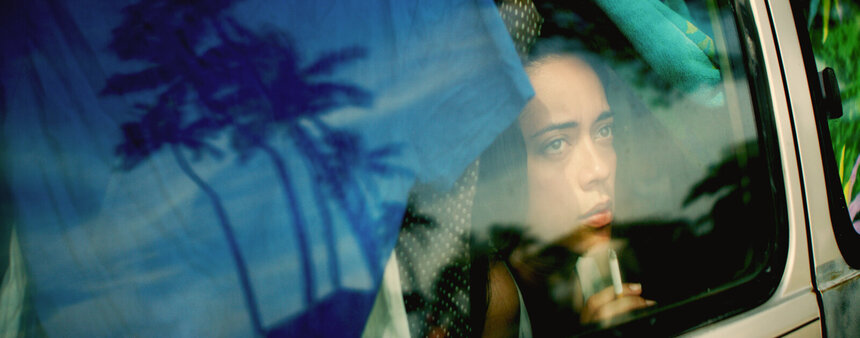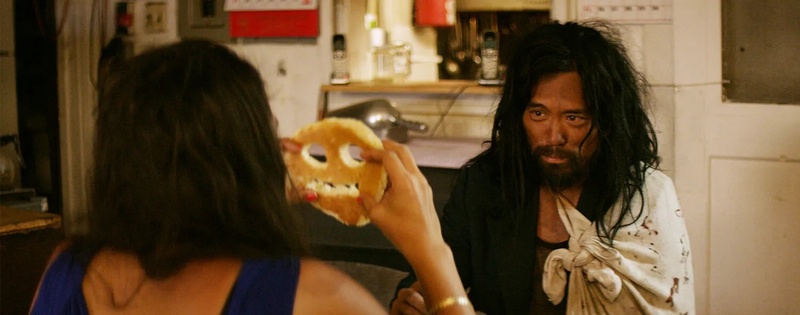WAIKIKI Review: The Slow Disintegration of Paradise

I think often that many people don’t realize that part of what we’ve made it be, to be a part of society, comes from having the financial means to participate. The less a person is able to do - whether it be as seemingly simple as meeting a friend for a coffee, or as basic for survival as having reasonable shelter, the world can be different, and a person can slip into another, off-kilter reality, the more apart they are forced to be. Especially if it is in the place that should be their land.
Christopher Kahunahana’s feature debut Waikiki looks at a fateful few days in the life of a woman whose already tenuous grasp on the most basic normalcy is slipping. The line that lies between those who are able to survive our contemporary existence and those who have been cast aside, perhaps at first figuratively but then literally, is both the main story, but also perhaps a metaphor for the Hawaiian lands as they have been warped and abused by more than a century of colonialism and the effects of tourism especially.
Kea (Danielle Zalopany), despite working three jobs, is living out of her van - she barely manages to keep her schedule, with teaching the Hawaiin language to local children, dancing for tourists, and working at a bar. Her abusive ex-partner and his aggression doesn’t help, especially when one night in fleeing from him, she accidentally hits a homeless man, Wo (Peter Shinkoda). This brief moment seems to send her on a final spiral downwards.
What does it mean to be apart from the world? And how would you view a world, more specifically, the society around you if you are not admitted to participation? Kea’s luck seems to be running out - she has cash for a deposit on an apartment, but society wants a credit score and a proper bank account; the van might be hers, but as long as her ex’s name is on the registration, she can’t keep it. Is she, then, about to cross that line into the homeless word of tents and paper cup handouts? She already has to use public washrooms for her basic hygiene, and even that proverbial door seems to be slamming shut.
Sometimes the daylight brings joy - the morning light as it filters through the coverings of her van windows, giving a brief moment of joy before her days begins. Her teaches to the children might be a lesson they keep in their hearts and minds. Sometimes the night brings calm: a boss who has a moment of understanding and offers kindness. But then the day’s light turns harsh; the night means danger and loneliness. The moment Kea cannot keep up with society’s expectations by even the smallest margin, she is an object to be ridiculed.
Kahunahana shows us the world that Kea comes from: this land, that belonged to her ancestors - Kea thinks on her grandmother, the lush forests and clean rivers of her childhood, the safety that came with them. Then Kahunahana shows us what has happened to this place: all concrete, highways, white people’s warped entitlement and expectations from natives like Kea - she is there is serve and wear a fake smile. He also shows how Kea is slipping away from her barely grasped reality - the more time she spends with Wo, the more she might be becoming like him, detached from the world and the people around her, seeing more and more of the small nightmares that encroach upon the world, that most of us are able to ignore. Zalopany gives us every moment with Kea - each crack in her armour, we hope the light will reach her, but it seems it just seems out, and we can’t help but almost physically reach out to try and grab her before she falls. Kahunahana is also sure to make us understand how her view of the world is shifting, and we have to see this reality as she now sees it, which becomes strange, untenable, fractured.
Wo is neither native Hawaiian nor a settler - he is a stranger not only in background, but by virtue of his status as a homeless person. And is he even real? Kahunahana never answers that question, whether he is just a growing figment of Kea’s imagination, someone she either fears she will become, or a kind of Virgil she needs as she descends into this hell.
Most of us are aware of the terrible fire that hit Maui few months ago, which highlighted not only growing climate change disasters, but ones particular to Hawaii - a colonized land overrun by tourists and its related activities that have increased the stress on and devastation of the natural land and its indigenous people, where water must keep flowing to the resorts and golf courses before the people and land. It’s not hard to imagine Kea’s slow disintegration as symbolic of this. Waikiki forces us to look upon those whom we want to either keep a smile plastered to their face, or would keep themselves in the gutter.
Waikiki opens in theaters across the US including New York, at the Regal Union Square and Los Angeles, at the Laemmle Noho, on October 27th.








